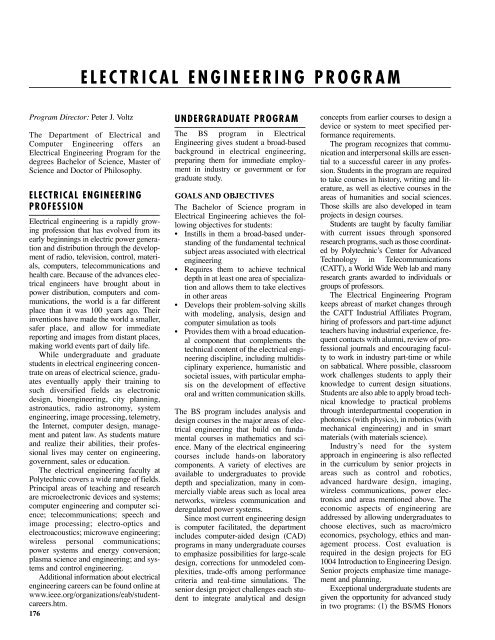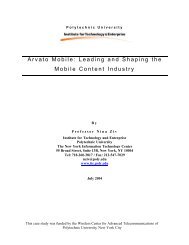POLYTECHNIC UNIVERSITY 2005-2007
POLYTECHNIC UNIVERSITY 2005-2007
POLYTECHNIC UNIVERSITY 2005-2007
You also want an ePaper? Increase the reach of your titles
YUMPU automatically turns print PDFs into web optimized ePapers that Google loves.
ELECTRICAL ENGINEERING PROGRAM<br />
Program Director: Peter J. Voltz<br />
The Department of Electrical and<br />
Computer Engineering offers an<br />
Electrical Engineering Program for the<br />
degrees Bachelor of Science, Master of<br />
Science and Doctor of Philosophy.<br />
ELECTRICAL ENGINEERING<br />
PROFESSION<br />
Electrical engineering is a rapidly growing<br />
profession that has evolved from its<br />
early beginnings in electric power generation<br />
and distribution through the development<br />
of radio, television, control, materials,<br />
computers, telecommunications and<br />
health care. Because of the advances electrical<br />
engineers have brought about in<br />
power distribution, computers and communications,<br />
the world is a far different<br />
place than it was 100 years ago. Their<br />
inventions have made the world a smaller,<br />
safer place, and allow for immediate<br />
reporting and images from distant places,<br />
making world events part of daily life.<br />
While undergraduate and graduate<br />
students in electrical engineering concentrate<br />
on areas of electrical science, graduates<br />
eventually apply their training to<br />
such diversified fields as electronic<br />
design, bioengineering, city planning,<br />
astronautics, radio astronomy, system<br />
engineering, image processing, telemetry,<br />
the Internet, computer design, management<br />
and patent law. As students mature<br />
and realize their abilities, their professional<br />
lives may center on engineering,<br />
government, sales or education.<br />
The electrical engineering faculty at<br />
Polytechnic covers a wide range of fields.<br />
Principal areas of teaching and research<br />
are microelectronic devices and systems;<br />
computer engineering and computer science;<br />
telecommunications; speech and<br />
image processing; electro-optics and<br />
electroacoustics; microwave engineering;<br />
wireless personal communications;<br />
power systems and energy conversion;<br />
plasma science and engineering; and systems<br />
and control engineering.<br />
Additional information about electrical<br />
engineering careers can be found online at<br />
www.ieee.org/organizations/eab/studentcareers.htm.<br />
176<br />
UNDERGRADUATE PROGRAM<br />
The BS program in Electrical<br />
Engineering gives student a broad-based<br />
background in electrical engineering,<br />
preparing them for immediate employment<br />
in industry or government or for<br />
graduate study.<br />
GOALS AND OBJECTIVES<br />
The Bachelor of Science program in<br />
Electrical Engineering achieves the following<br />
objectives for students:<br />
• Instills in them a broad-based understanding<br />
of the fundamental technical<br />
subject areas associated with electrical<br />
engineering<br />
• Requires them to achieve technical<br />
depth in at least one area of specialization<br />
and allows them to take electives<br />
in other areas<br />
• Develops their problem-solving skills<br />
with modeling, analysis, design and<br />
computer simulation as tools<br />
• Provides them with a broad educational<br />
component that complements the<br />
technical content of the electrical engineering<br />
discipline, including multidisciplinary<br />
experience, humanistic and<br />
societal issues, with particular emphasis<br />
on the development of effective<br />
oral and written communication skills.<br />
The BS program includes analysis and<br />
design courses in the major areas of electrical<br />
engineering that build on fundamental<br />
courses in mathematics and science.<br />
Many of the electrical engineering<br />
courses include hands-on laboratory<br />
components. A variety of electives are<br />
available to undergraduates to provide<br />
depth and specialization, many in commercially<br />
viable areas such as local area<br />
networks, wireless communication and<br />
deregulated power systems.<br />
Since most current engineering design<br />
is computer facilitated, the department<br />
includes computer-aided design (CAD)<br />
programs in many undergraduate courses<br />
to emphasize possibilities for large-scale<br />
design, corrections for unmodeled complexities,<br />
trade-offs among performance<br />
criteria and real-time simulations. The<br />
senior design project challenges each student<br />
to integrate analytical and design<br />
concepts from earlier courses to design a<br />
device or system to meet specified performance<br />
requirements.<br />
The program recognizes that communication<br />
and interpersonal skills are essential<br />
to a successful career in any profession.<br />
Students in the program are required<br />
to take courses in history, writing and literature,<br />
as well as elective courses in the<br />
areas of humanities and social sciences.<br />
Those skills are also developed in team<br />
projects in design courses.<br />
Students are taught by faculty familiar<br />
with current issues through sponsored<br />
research programs, such as those coordinated<br />
by Polytechnic’s Center for Advanced<br />
Technology in Telecommunications<br />
(CATT), a World Wide Web lab and many<br />
research grants awarded to individuals or<br />
groups of professors.<br />
The Electrical Engineering Program<br />
keeps abreast of market changes through<br />
the CATT Industrial Affiliates Program,<br />
hiring of professors and part-time adjunct<br />
teachers having industrial experience, frequent<br />
contacts with alumni, review of professional<br />
journals and encouraging faculty<br />
to work in industry part-time or while<br />
on sabbatical. Where possible, classroom<br />
work challenges students to apply their<br />
knowledge to current design situations.<br />
Students are also able to apply broad technical<br />
knowledge to practical problems<br />
through interdepartmental cooperation in<br />
photonics (with physics), in robotics (with<br />
mechanical engineering) and in smart<br />
materials (with materials science).<br />
Industry’s need for the system<br />
approach in engineering is also reflected<br />
in the curriculum by senior projects in<br />
areas such as control and robotics,<br />
advanced hardware design, imaging,<br />
wireless communications, power electronics<br />
and areas mentioned above. The<br />
economic aspects of engineering are<br />
addressed by allowing undergraduates to<br />
choose electives, such as macro/micro<br />
economics, psychology, ethics and management<br />
process. Cost evaluation is<br />
required in the design projects for EG<br />
1004 Introduction to Engineering Design.<br />
Senior projects emphasize time management<br />
and planning.<br />
Exceptional undergraduate students are<br />
given the opportunity for advanced study<br />
in two programs: (1) the BS/MS Honors




